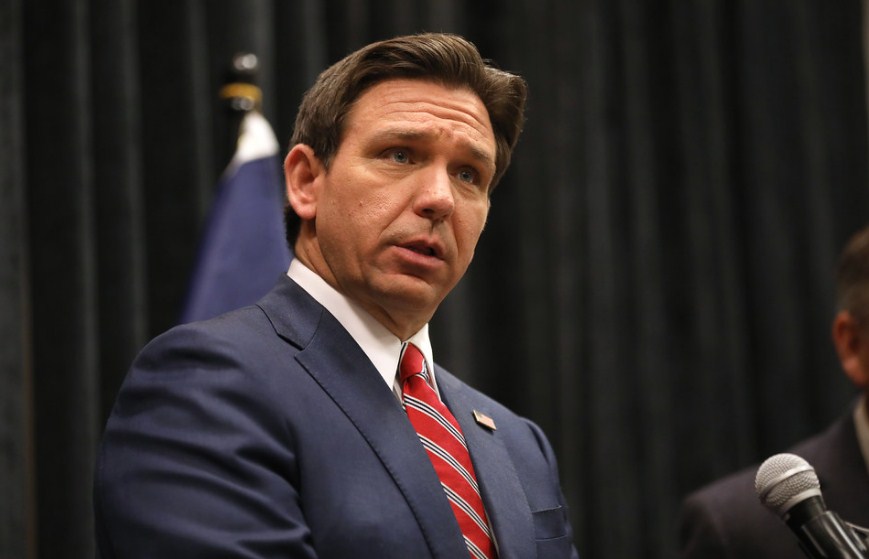Governor supports four amendments to limit federal power and spending
Florida Governor Ron DeSantis announced his support for four proposed amendments to the U.S. Constitution on Monday, aiming to curb the excesses and abuses of the federal government. He was joined by House Speaker Paul Renner and conservative activist Tarren Bragdon, the leader of the Foundation for Government Accountability, a group that advocates for the amendments.
DeSantis said the amendments would restore the balance of power between the states and the federal government, and hold Washington accountable for its fiscal irresponsibility and overreach. He urged the Florida Legislature to pass resolutions calling for a constitutional convention to take up the amendments, as allowed by Article V of the U.S. Constitution.
The four amendments
The four amendments that DeSantis endorsed are:
- An amendment to impose term limits on members of Congress, to prevent career politicians from entrenching themselves in power and losing touch with the people they represent.
- An amendment to require Congress to pass a balanced budget each year, to stop the federal government from spending beyond its means and piling up debt for future generations.
- An amendment to provide the President with line-item veto power, to allow the executive branch to eliminate wasteful and unnecessary spending from budget bills.
- An amendment to prohibit imposing any law on citizens that doesn’t apply to members of Congress, to ensure that lawmakers are not exempt from the rules and regulations they impose on the rest of the country.
DeSantis said these amendments are “broadly appealing reforms” that are “long overdue” and represent “appropriate corrective measures to the ills that we have been witnessing in Washington, D.C., not just over the last few years but really over the last many decades.”

The constitutional convention process
The U.S. Constitution provides two methods for proposing amendments: either by a two-thirds vote of both houses of Congress, or by a convention called by two-thirds of the state legislatures. In either case, the proposed amendments must be ratified by three-fourths of the states to become part of the Constitution.
So far, all 27 amendments to the U.S. Constitution have been proposed by Congress and ratified by the states. The constitutional convention method has never been used, although there have been several attempts to initiate it in the past.
The Florida House has already passed two resolutions, HCR 693 and HCR 703, to petition Congress to call a constitutional convention for the purpose of proposing term limits and a balanced budget amendment, respectively. The resolutions state that Florida’s participation in the convention is limited to those specific topics, and that Florida will withdraw its petition if the convention goes beyond its scope.
The resolutions are pending in the Florida Senate, where they are expected to pass this week. If approved, Florida will join 15 other states that have already passed similar resolutions for term limits, and 28 other states that have done so for a balanced budget amendment.
The opposition and the challenges
The idea of a constitutional convention has faced opposition from some lawmakers and groups who fear that it could open the door for a “runaway convention” that could rewrite or repeal other parts of the Constitution, such as the Bill of Rights or the Electoral College.
House Democratic Leader Fentrice Driskell expressed her concerns about the lack of guardrails and safeguards for the convention process, and questioned the wisdom of tinkering with the nation’s founding document.
“What are the guardrails? And what are some of the things that we could do if there is a problem?” Driskell asked on the House floor earlier this month.
Some legal experts have also raised doubts about the feasibility and legality of a constitutional convention, arguing that there are many unresolved questions and ambiguities about how it would work, who would participate, how the delegates would be chosen, what rules would govern the proceedings, and how the proposed amendments would be ratified.
Even if a constitutional convention is successfully convened and proposes amendments, they would still face the challenge of getting ratified by three-fourths of the states, which is a high bar to clear in a polarized political climate.
The national relevance
DeSantis’ endorsement of the constitutional amendments comes as he continues to position himself as a national leader of the conservative movement and a potential presidential contender in 2024. He has been vocal in his criticism of the Biden administration and its policies on immigration, COVID-19, and foreign affairs.
DeSantis also took a swipe at former President Donald Trump, who he had endorsed for reelection in 2020, by implying that he was not capable of defeating Biden in 2024.
“I think the Republican Party needs to have a nominee who can win, who can actually beat Joe Biden, and I don’t think that’s going to be easy,” DeSantis said.
DeSantis made his announcement in Naples, the home turf of U.S. Senator Rick Scott, who is also a potential presidential candidate and a former Florida governor. Scott has been a vocal supporter of a balanced budget amendment and a critic of federal spending.
DeSantis said he hopes that other states will follow Florida’s lead and join the movement for constitutional reforms.

Comments